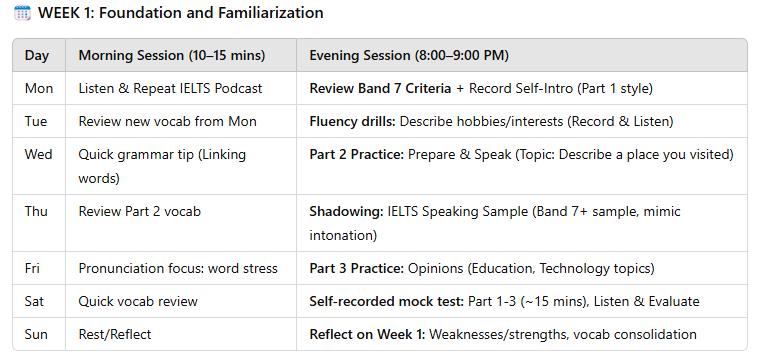AI Blog: AI Prompt Engineering Part 2
18 April 2025
Welcome back to our AI blog. Today, we seek to clearly describe relevant background information to help AI better understand your needs.
The rule is that the more context you provide, the better result the AI will give back to you. Let’s continue the Oral English improvement example from last time, but this time, we will try to add more details to the task description and see how it works.
"Act as an IELTS instructor with over 10 years of teaching experience. I am a postgraduate student at the University of Sydney (USYD) with an overall IELTS score of 7.5 (Listening: 8.5, Reading: 8.5, Writing: 6.5, Speaking: 6.5). My goal is to improve my Speaking score from 6.5 to 7.0 within one month. I am available daily from 8:00 to 9:00 PM for focused study, with additional short practice sessions possible in the mornings. Design a structured, high-impact 1-month study plan in a clear timetable format, prioritising IELTS Speaking strategies tailored to my schedule and target band score."

This time, the outcome is tailored specifically for you, considering your English foundation, and intends to help you achieve the target within a month. ChatGPT also provides you with a tracking document or a printable schedule to help you follow the timetable.
Remember, AI is especially good at incorporating examples.
In the previous prompt example, you already gave reference data like:
- Current score breakdown: Speaking 6.5
- Target: Speaking 7.0 in one month
- Availability: 8:00–9:00 PM daily + morning mini-sessions
- Background: Postgraduate student at USYD.
All the above references help ChatGPT customise the study timetable for you. Now stick to it or else.
Jokes aside, you should always challenge responses. You should check for veracity and also whether it provides what you want. As an illustration, let’s continue with the IELTS example. You may evaluate the timetable based upon:
- Does the plan fit your daily availability?
- Is it achievable that you may obtain a 0.5 band improvement in one month?
- Does it include necessary practice and possible IELTS Speaking topics?
- Is there a balance among practice, feedback and mock exams?
If you are not satisfied with the result, the next step is to iterate. In this instance, after evaluation, you can adjust or re-prompt (it’s a word, look it up). Maybe you can ask for:
- More pronunciation-focused activities
- Regular mock speaking tests.
For example, “Revise the study plan to include mock Speaking Part 2 tests every Sunday evening and add 10-minute pronunciation drills in the weekday mornings”.
We can repeat this circular process to refine the prompt until we get the plan we feel happy with. And then all we need to do is achieve the goal!

